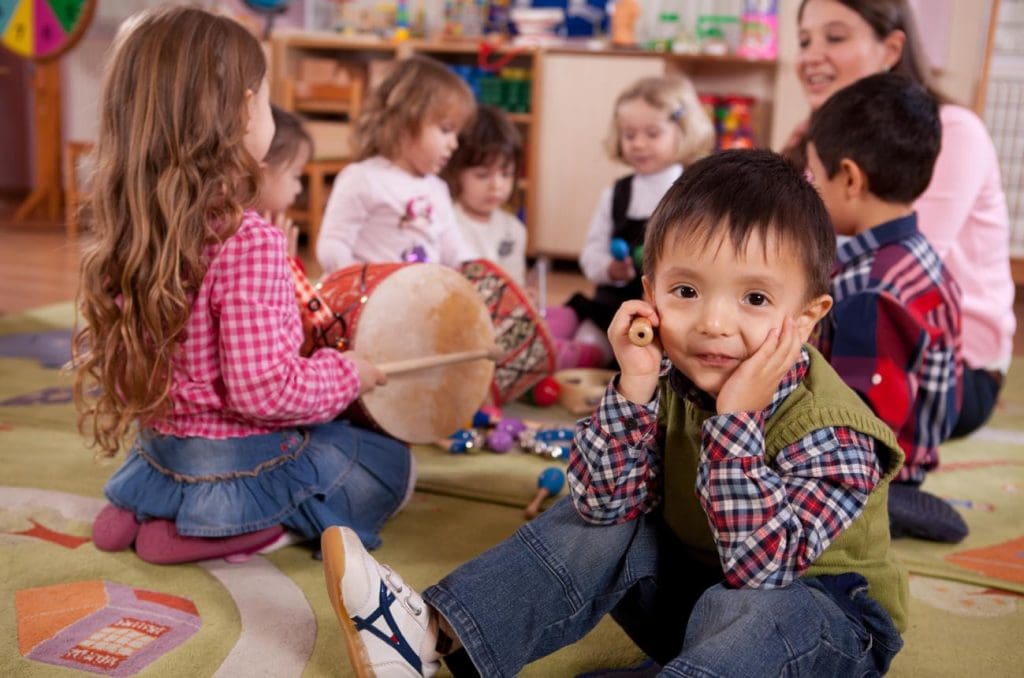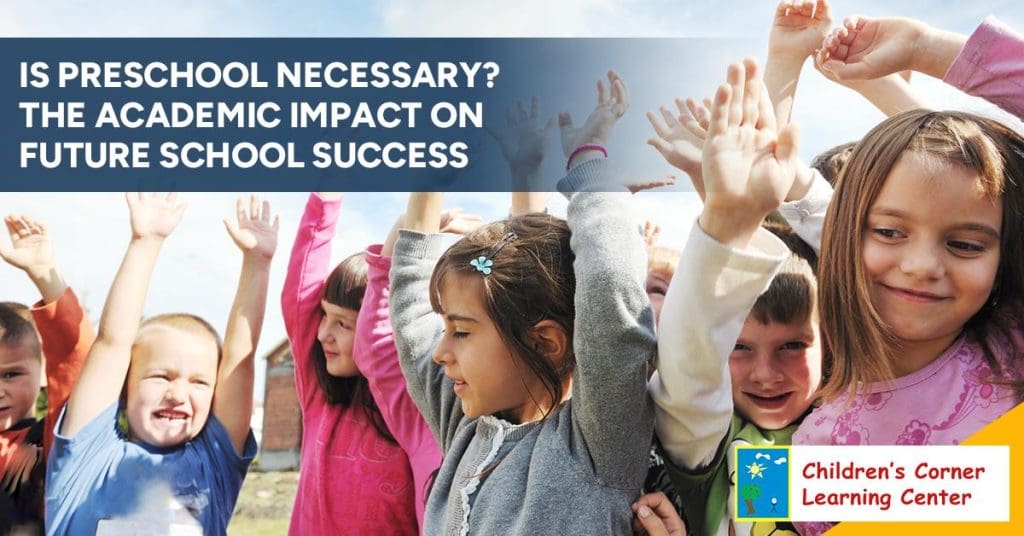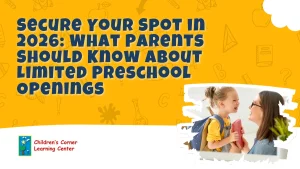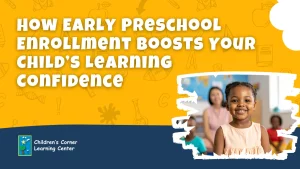Is preschool necessaryfor your child’s development? Preschool, like Children’s Corner, provides children a setting to develop essential skills such as social interaction, emotional regulation, and early literacy and numeracy.
These formative experiences help prepare children for elementary school’s structured learning and social dynamics. By nurturing a love for learning from a young age, preschool sets the stage for a smoother transition into formal education, ensuring that children are well-prepared to thrive academically and socially.
Is Preschool Required for School Readiness: Definition and Meaning
School readiness refers to a child’s preparedness for kindergarten’s academic and social demands and beyond. It encompasses a range of skills, including cognitive abilities, language development, emotional regulation, and social competence.
A school-ready child can follow instructions, interact positively with peers and teachers, and engage in basic literacy and numeracy tasks. School readiness sets the stage for a smooth transition into formal education, helping children feel confident and capable as they embark on their academic journey.
Overview of Preschool Education
Preschool education is designed for children typically between the ages of three and five, providing an early learning environment that blends play with structured activities. These programs focus on developing essential skills through interactive and engaging methods.
Activities in preschool are geared toward fostering curiosity, creativity, and a love for learning. They include storytelling, music, art, outdoor play, and basic academic tasks like counting and letter recognition. Preschools aim to create a balanced experience that nurtures the whole child—academically, socially, and emotionally.
Studies and Statistics on Preschool Attendance and Readiness
Research consistently highlights the positive impact of preschool on a child’s readiness for school. According to the National Institute for Early Education Research(NIEER), children who attend high-quality preschool programs are more prepared for kindergarten than those who do not. They show significant gains in vocabulary, early math skills, and social behaviors necessary for classroom success.
Several vital studies underline these benefits:
- The HighScopePerry Preschool Study: This longitudinal study followed children from preschool age into adulthood, demonstratingthat those who attended preschool had higher academic achievement, better social skills, and greater economic success later in life compared to their peers who did not attend preschool.
- The Abecedarian Project: Another influential study that provided comprehensive early education to disadvantaged children, showing lasting improvements in IQ, academic performance, and social-emotional skills.
Statistics further support the value of preschool education:
- Kindergarten Readiness: A report from the U.S. Department of Educationfound that children who attended preschool were significantly more likely to exhibitcritical readiness skills at kindergarten entry, such as recognizing letters and counting to 20.
- Long-term Academic Success: Research by the National Education Association(NEA) indicatesthat preschool attendees are less likely to need unique education services and more likely to graduate from high school.
While preschool may not be strictly requiredfor every child’s school readiness, it provides a substantial advantage in preparing children for the academic and social challenges of formal schooling.
Benefits of Preschool Education

Preschool education offers a wealth of benefits that extend well beyond the classroom. Parents enrolling children in preschool provides a strong foundationfor cognitive, social, and emotional development.
This early education sets the stage for future academic success, helping children acquireessential skills that will serve them throughout their lives. Let’sexplore the key benefits of preschool educationand how it positively impactsyoung learners.
Cognitive Development
Preschool is vital in a child’s cognitive development. During these formative years, children’s brains are highly receptive to information and experiences. Preschool programs stimulate mental growth through activities that promote problem-solving, critical thinking, and creativity.
For instance, puzzles, matching games, and interactive story sessions help children enhance their memory, attention, and reasoning skills. These activities are foundational for more complex learning tasks they will encounter in elementary school and beyond.
Social and Emotional Skills
One key benefit of preschool education is the development of social and emotional skills. Preschool provides children with their first structured opportunity to interact with peers outside their families. This environment helps children learn to share, take turns, and work collaboratively.
They also learn to manage their emotions, which is crucial for forming healthy relationships and handling social challenges. Through group activities and guided play, children develop empathy, patience, and communication skills, all essential for personal and academic success.
Early Literacy and Numeracy
Early exposure to literacy and numeracy is another significant advantage of preschool education. Preschool programs introduce children to reading, writing, and math basics through engaging and age-appropriate activities. Storytime, alphabet games, and counting exercises help children develop a love for reading and an understanding of numbers.
These foundational skills are critical for future academic achievement. By learning to recognize letters and numbers, children gain the confidence to tackle more advanced literacy and numeracy tasks in kindergarten and beyond.
Long-term Academic Advantages
The benefits of preschool education extend far beyond the early years. Numerous studies have confirmed that preschool children are more likely to succeed academically throughout their school years.
They are better prepared for the structured environment of kindergarten and exhibit greater enthusiasm for learning. Preschool attendees are also less likely to require special education services and are more likely to graduate from high school and pursue higher education.
Several long-term advantages include:
- Improved Academic Performance: Preschool graduates typically perform better on standardized tests and have higher grades in school.
- Increased Graduation Rates: Children attending preschool are more likely to complete high school and college.
- Enhanced Social Skills: The social and emotional skills developed in preschool contribute to better relationships with peers and teachers, leading to a more positive school experience.
Early literacy and numeracy skills gained in preschool set the stage for academic success, while social interactions help children navigate their school years with confidence and competence. Investing in preschool is an investment in a child’s future, providing them with the tools they need to thrive academically and personally.
Pros and Cons of Preschool Education
Preschool education is often hailed as a critical componentof early childhood development, but like any educational choice, it has its advantages and potential drawbacks. Understanding thepros and cons of preschooleducationcan help parents decide about their child’s early learning path.
Advantages of Attending Preschool
Attending preschool offers numerousbenefits that can significantly enhance a child’s early development. Some of the key advantages include:
- Structured Learning Environment: Preschools provide a structured environment where children can engage in various learning activities that provoke cognitive, social, and emotional development.
- Social Interaction: Preschool gives children the opportunity to interact with peers, helping them develop essential social skills such as sharing, cooperation, and conflict resolution.
- Exposure to Diverse Activities: From art and music to science and physical activities, preschool exposes children to different subjects, fostering a love for learning and curiosity.
- Preparation for Kindergarten: Preschool prepares children for kindergarten’s academic and social demands. They learn to follow guidelines, work in groups, and adapt to a classroom setting.
- Development of Independence: Preschool encourages children to develop independence and self-confidence by providing opportunities to make choices and complete tasks independently.
Potential Drawbacks and Concerns
While the benefits of preschool are significant, there are also some potential drawbacks and concerns that parents should consider:
- Cost: Quality preschool programs can be expensive, which may be a barrier for some families. Financial strain can impacta family’s ability to access high-quality early education.
- Separation Anxiety: Some children may experience separation anxiety when starting preschool, which can be challenging for both the child and the parents.
- Quality Variation: Not all preschools offer the same level of quality in terms of curriculum, teacher qualifications, and facilities. Choosing the right preschool requires careful research and consideration.
- Over-Scheduling: There is a concern that some preschools may overly structure children’s time, leaving little room for free play and creativity, which are also vital for development.
Comparing Preschool to Alternative Early Childhood Education Options
When deciding on early childhood education, it’sessential to compare preschool with other available options, such as home-based care and informal educational settings:
Home-Based Care:
- Pros: Provides a familiar environment, potentially more individualized attention, and flexibility in schedule.
- Cons: May lack the structured learning environment and social interaction opportunities that preschool offers.
Informal Educational Settings:
- Pros: Can include playgroups, community activities, and parent-led educational activities, offering a more flexible and less formal approach to early learning.
- Cons: May not provide the same level of academic preparation and structured socialization as preschool.
Combination Approaches:
- Pros: Some families opt for a mix of preschool and home-based care, balancing structured learning with the comfort of home.
- Cons: Requires careful planning to ensure the child receives a well-rounded early education experience.
While preschool offers many advantages that can significantly contribute to a child’s early development, it also presents specific challenges and considerations. Parents can make decisions that best suit their child’s needs and family circumstances by weighing the pros and cons and comparing preschool to other early childhood education options.
Parental Involvement and Preschool Success
Parental involvement is crucial to a child’s success in preschool. When parents actively engage in their child’s early education, they reinforce learning, foster emotional security, and build a foundation for lifelong academic achievement.
The Impact of Parental Engagement on Preschool Outcomes
Research shows that children whose parents are part of their education tend to perform better academically and socially. Parental engagementcan positively influence various aspects of a child’s preschool experience, including:
- Enhanced Cognitive Development: When parents engage in educational activities at home, such as reading stories, playing educational games, or discussing daily experiences, they help enhance their child’s cognitive skills.
- Improved Social Skills: Children with engaged parents often exhibitbetter social behaviors, such as cooperation, empathy, and effective communication. These skills are critical for forming positive relationships with peers and teachers.
- Higher Academic Achievement: Parental involvement has been linked to higher academic achievement, as children feel more supported and motivated to learn when their parents show interest in their education.
- Greater Emotional Security: Active parental involvement helps children feel secure and confident, reducing anxiety and improving their overall well-being in a preschool setting.
Ways Parents Can Support Their Child's Preschool Experience
There are several practical ways parents can support their child’s preschool experience, ensuring they get the most out of this critical stage of development:
- Establisha Routine: Creating a consistent daily routine helps children feel secure. This includes regular bedtimes, meal times, and designated periods for play and learning.
- Engage in Learning Activities: Incorporate educational activities into daily routines, such as reading books, playing counting games, and exploring nature. These activities make learning enjoyable and reinforce concepts taught in preschool.
- Communicate Regularly: Talk to your child about their day at preschool. Ask open-ended questions to inspire them to share their experiences, feelings, and challenges.
- Volunteer and Participate: Whenever possible, volunteer for activities and events at the preschool. This involvement shows your child that you value their education and helps you stay connected with their learning environment.
- Provide a Supportive Home Environment: Create a positive and stimulating home environment that encourages curiosity and learning. Provide access to books, educational toys, and creative materials.
Building a Strong Parent-Teacher Partnership

A strong parent-teacher partnership is essential for supporting a child’s preschool success. Effective collaboration between parents and teachers creates a cohesive and supportive educational experience. Here are some ways to build and maintainthis partnership:
- Regular Communication: Establishopen communication with your child’s teacher. Discuss your child’s progress, strengths, and areas for improvement regularly. Share any concerns or observations you may have.
- Attend Parent-Teacher Meetings: Make it necessary to attend scheduled parent-teacher conferences. These meetingsprovideunique insights into your child’s development and offer an opportunity to discuss support strategies.
- Collaborate on Goals: Work with the teacher to set achievable goals for your child’s development. Collaborate on strategies to support these goals both at home and in the classroom.
- Be Responsive and Supportive: Respond promptly to teacher communications and be supportive of their efforts. Show appreciation for their dedication and commitment to your child’s education.
- Participatein School Events: Attend school events and activities, such as open houses, performances, and workshops. These events help build community and strengthen the connection between parents, teachers, and students.
Parents can enhance cognitive development, improve social skills, and foster emotional security by actively engaging in their child’s education. Building a strong parent-teacher partnership further supports a child’s growth and sets the stage for continued academic achievement.
The Importance of Preschool Education for Your Child's Future
The journey through preschool is a pivotal chapter in a child’s life, laying the groundwork for future academic and personal success. From cognitive development and social skills to early literacy and numeracy, the benefits of preschool are profound and far-reaching. Engaged parental involvement and a solid parent-teacher partnership amplify these advantages, ensuring that children are well-prepared for the exciting challenges of elementary school and beyond. Preschool is more than just preparation for kindergarten; it’s an investment in a child’s lifelong love for learning, curiosity, and confidence.
Book a tour of Children’s Corner today and see firsthand how our programs can benefit your little one. Visit this pageor call us at (800) 933-7757 to schedule your tour. Let’s work together to build a brighter future for your child!









